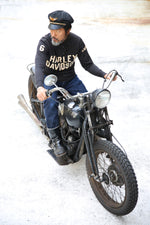 Peter Plotnicki of Merz b Schwanen
Peter Plotnicki of Merz b Schwanen
A firm favourite among our customers and ourselves, Merz b Schwanen have been part of the Pickings and Parry brand stable since the beginning. Their incredible circular knitted Henley Shirts, T-Shirts and Sweats are staples of our wardrobes and continue to perform and fit well after many wears and washes over the years.
The vast majority of Merz products are manufactured using original circular knitting looms, also known as loop wheeler machines, in their original factory based in the Schwabian Alpine region of South East Germany. The process of circular knitting means that the fabric is woven in a continuous circle, or tube, and the fabric used for the body and sleeves of a garment can therefore be created without a seam joining it together. This has obvious benefits for the comfort and shape of the garment, which is clearly evident when you pull on a Merz shirt for the first time.
 Images from inside the Merz factory
Images from inside the Merz factory
Circular knitting produces fantastic fabric, but the process is inherently slow and a different sized machine must be used for each section and size of garment. Most original machines can only perform 24 rotations per minute, which is so slow you can count them and adds up to around one meter of fabric per hour. The painfully slow pace is essential, however, as the machines places no tension on the cotton yarns as they knit, which creates a softer and denser fabric than pretty much anything else around.
 Images from Guiseppe Negra’s 1926 loopwheel patent.
Images from Guiseppe Negra’s 1926 loopwheel patent.
The incredibly slow pace of the loopwheel process meant that by the 1950's, most manufacturers began replacing their circular machines with faster, more modern, flat knitting looms to bring down costs and increase output. Today there are only around 200 machines left and, as none have been produced since the 70's, most are 50 years old or more. The only two remaining full production circular knitting factories left in the world are the Merz b Schwanen factory in Germany, and the Loopwheeler operation in Japan's Wakayama prefecture - who make high quality circular knitted garments for many well known Japanese brands (including Buzz Rickson sweats - coming soon to P&P!)
So, in a nutshell, the process is slow and the result can be expensive. But you don't get the same durability, feel or quality with anything else. People often say 'they don't make them like they used to' - well, they do at the Merz b Schwanen factory...

